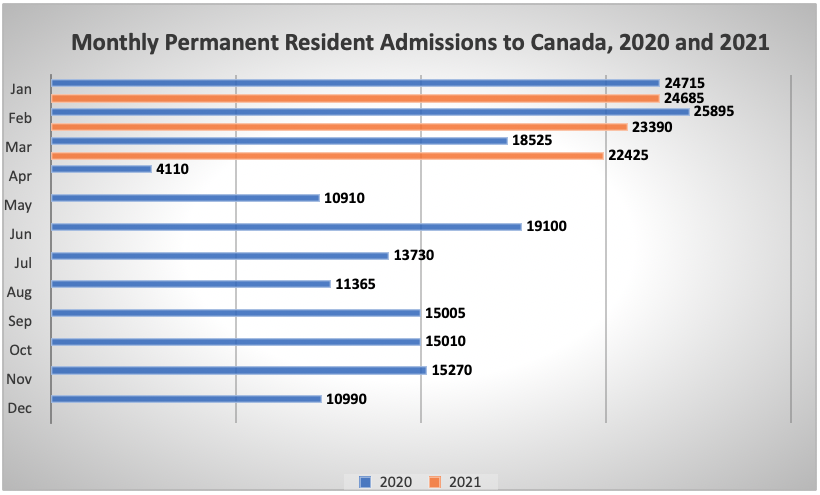
Canada has extended its ban on flights from India and Pakistan, aimed at stopping the spread of variants of COVID-19 prevalent in the two countries.
An announcement on Friday saw the ban extended until June 21, after it was first imposed on April 22. It was due to expire on Saturday, May 22.
Cargo flights continue to be exempt from the ban, to allow the delivery of essential goods including coronavirus vaccines.
Read More
Canada Suspends Passenger Flights From India and Pakistan Due To COVID-19
COVID-19: Closure Of Canada-U.S. Border, International Travel Restrictions Extended Another Month
Canada’s Rural & Northern Immigration Pilot Limited By COVID-19 Travel Restrictions
Although direct flights continue to be banned, passengers can still reach Canada from India and Pakistan by flying via another country. They still need to adhere to all COVID-19 safety measures, including producing a negative test from the country they departed to reach Canada.
All those arriving in Canada must quarantine for two weeks unless they are exempt. Air travellers must spend three days in a government-approved hotel while waiting for test results, then test again eight days after arrival.
Exemptions for Non-Discretionary Travel
Canada has exemptions in place for the following people, provided they are travelling for a non-discretionary reason:
- Seasonal agricultural workers, fish/seafood workers, caregivers and all other temporary foreign workers;
- International students who held a valid study permit, or had been approved for a study permit, when the travel restrictions took effect on March 18, 2020. More international students are now allowed to travel from October 20 last year under a new exemption;
- Permanent resident applicants who had been approved for permanent residence before the travel restrictions were announced but who had not yet travelled to Canada;
- Immediate family members of Canadian citizens and permanent residents are also exempt if entering to be with an immediate family member for at least 15 days, and;
- Extended family members of citizens and permanent residents, plus foreign nationals travelling on compassionate grounds.
Transport Minister Omar Alghabra announced the extension at a press conference on Friday, saying it was ‘based on public health advice’.
He added: “I can say that we’ve seen a significant reduction in the number of positive cases of COVID-19 arriving from international flights since this restriction was put in place.”
Dr. Howard Njoo, Canada’s deputy chief public health officer, described the move as ‘another layer of protection’.
According to Public Health data, Canada saw more than 6,250 air travellers test positive for the B.1.617 variant (first found in India) between February 22 and May 6.
India reported 4,529 deaths from coronavirus on Wednesday, the most in a single day of any country during the pandemic. India has 283,248 confirmed deaths from the disease.
Meanwhile, Canada has extended both international travel restrictions and the closure of the border with the U.S. for another month, until June 21, 2021.
Bill Blair, Minister of Public Safety and Emergency Preparedness made the announcement in a tweet on Thursday, May 20. The restrictions had been due to expire on May 21.
Immigration Numbers Recover At Start Of 2021
The latest federal government figures show Canada welcomed 70,500 newcomers in the first three months of the year, compared to just over 69,000 in 2020 – a solid start on its way to an ambitious target of 401,000.
January to March was easily the most prolific quarter for Canada immigration since the start of the coronavirus crisis.
However, the numbers are still well short of those needed for Canada to its target. If 70,500 newcomers are welcomed every quarter this year, the total would reach only 282,000 permanent resident admissions.
Ottawa is clearly expecting a major increase in the remaining three quarters, boosted by the new pathway the permanent residence launched this month, through which it expects to receive 90,000 applications from international graduates, healthcare workers and other essential workers.
Meanwhile, Immigration, Refugees and Citizenship Canada (IRCC) has also significantly increased the numbers of Invitations to Apply being issued through Express Entry, including 27,332 in a single Canadian Experience Class draw on February 13.
These candidates, 90 percent of them already in Canada, are likely to make the transition to permanent residency in the second half of the year.
Immigration Minister Marco Mendicino remains confident Canada will hit the 401,000 targets, set in the fall 2020 immigration levels plan.
“I am confident that we are doing everything we can to meet that target and we will meet that target and the reason it is important to hit that target is that immigrants create jobs … and allow us to meet our workforce needs,” he said in a recent press conference.


